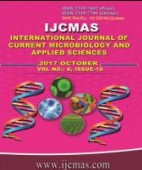


 National Academy of Agricultural Sciences (NAAS)
National Academy of Agricultural Sciences (NAAS)

|
PRINT ISSN : 2319-7692
Online ISSN : 2319-7706 Issues : 12 per year Publisher : Excellent Publishers Email : editorijcmas@gmail.com / submit@ijcmas.com Editor-in-chief: Dr.M.Prakash Index Copernicus ICV 2018: 95.39 NAAS RATING 2020: 5.38 |
Bovine brucellosis is one of the most wide-spread zoonosis accounting for enormous economic losses through abortion, stillbirths, reduction of milk yield and infertility. Brucellosis has wide socioeconomic impacts, especially in countries in which rural income relies on livestock breeding and dairy products. So early and accurate diagnosis is essential to avoid the losses occurred due to brucellosis. The present study reports the isolation, identification and molecular detection of Brucella abortus. We have collected610 serum samples, 5 foetal abomasal contents and 5 foetal tissues from dairy farms of cattle and buffalo in and around Mumbai and Pune region. Out of 610 sera samples, 135 were detected positive by RBPT. These sero positive animals (n=135) were then subjected to blood collection and DNA isolation. Similarly vaginal swabs were collected from the seropositive females (n=92). Vaginal swabs, abomasal contents and foetal tissues were processed by cultural isolation on Brucella Agar Media with selective antibiotic supplements. We have successfully recovered 14bacterial isolates on cultural isolation, identified as Brucella by colony character, Gram’s staining, MZN staining and biochemical tests. The recovered bacterial cultures and Brucella reference strains (B. abortusS19, B. abortus544 and B.melitensis Rev1) were further processed for DNA isolation. The DNA isolated from seropositive animals, bacterial cultures and the reference strains were subjected to genus (Brucella) specific PCR using BCSP 31 B4/B5 primer pair and species (B. abortus) specific PCR using IS711/AB primers. As expected, the PCR analysis of reference strains revealed genus specific amplicon (223bp) in all the three strains, and only B. abortus S19 and B. abortus544 exhibited species specific amplicon (498 bp).All the 14 cultural isolates and 83 seropositive animals were positive for genus specific PCR. While in species specific PCR, 10 cultural isolates and 29 seropositive animals were confirmed as B. abortus. The PCR products of five representative field isolates were sequenced directly and analysed by bio informatic tools. The obtained nucleotide sequence exhibited 100% homology with other strains of B. abortus in the GenBank database.
 |
 |
 |
 |
 |